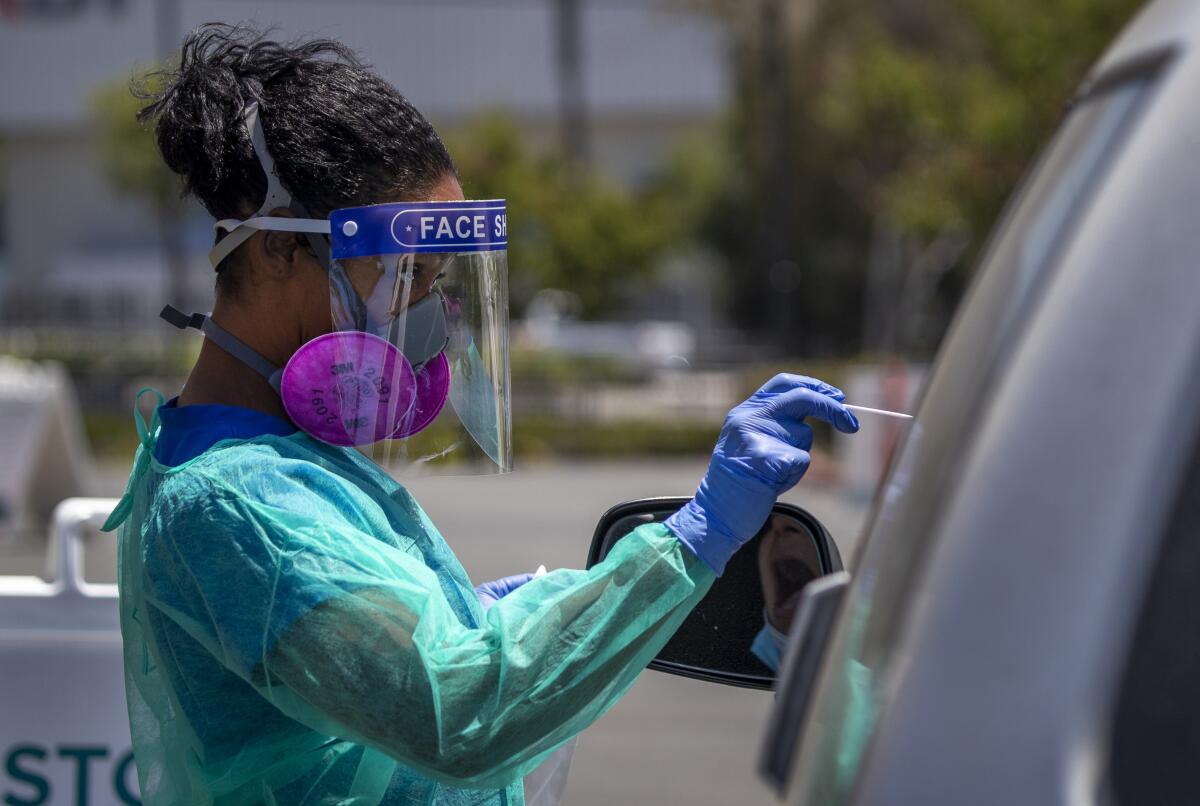Opinion newsletter: We need to hear COVID-19 horror stories

- Share via
Good morning. I’m Paul Thornton, and it is Saturday, July 11, 2020. Fun fact: I was supposed to be in Norway today, but you can guess how that turned out. Let’s take a look back at the week in Opinion.
With California no longer held up as a coronavirus success story (turns out our urban sprawl couldn’t save us, despite the early hubristic assurances of certain pundits), you’re probably reading fewer pieces positing the lessons we can draw from this pandemic and more that deal with a much more urgent matter: How on the gods’ green Earth can we make it out of this alive, both in a literal sense as individuals and also more broadly as a society?
A cure for the common opinion
Get thought-provoking perspectives with our weekly newsletter.
You may occasionally receive promotional content from the Los Angeles Times.
Both aspects of this question were dealt with quite compellingly in Opinion this week. The policy questions are important, but deeply personal, highly emotional experiences are most effective at moving people to address larger questions. In that sense, the op-ed article by prominent legal commentator David Lat on recovering from his near-death bout with COVID-19 months ago is a must-read for understanding of how unsparingly this virus can alter the lives of people it infects but does not kill.
Lat’s real-life experience ought to ring in the ears of anyone who goes on to read this piece on COVID-19 death projections by the University of Washington’s Christopher J.L. Murray, whose model on predicting the impact of the pandemic has been both widely cited and widely criticized. It’s important for our coronavirus response to be driven by data, and Murray’s piece details the limitations of using that data for projections. It’s also important to keep in mind the very real human suffering unfolding as the pandemic intensifies and to remind ourselves that those data points represent lives upended and ended.
Makes you want to wear a mask, doesn’t it? It should, but not for enough people, which is why the L.A. Times Editorial Board calls for a national mask mandate. In California, we are already required to cover our noses and mouths when out and about, but columnist Nicholas Goldberg notices enough bare faces in public to conclude that we need to start enforcing mask rules. Our readers, most of whom have long expressed support for mask mandates, are tired of what they describe as public displays of carelessness by too many people.
What went wrong in California? Our state, prematurely lauded as a coronavirus success story, has seen its per-capita case count top the national average. California was right to shut down when it did and right to begin reopening when it did, writes Dr. Robert M. Wachter of UC San Francisco, but it erred by doing too much too soon. It also didn’t help to have a sizable population of mask refusers. The Atlantic
The latest addition to the Trump tell-all memoir genre is dark. Mary Trump, the president’s niece, has not served in this administration and therefore has no inside tales from the rooms where it happened. But her most important insight is that of the president’s cruel upbringing, rendering him “stuck in an m.o. that cripples a person emotionally and cognitively every bit as much as a prison would,” writes columnist Virginia Heffernan. L.A. Times
Enjoying this newsletter? Consider subscribing to the Los Angeles Times
Your support helps us deliver the news that matters most. Become a subscriber.
Hear ye, hear ye, Trump is not your king. For a group of justices known for deciding cases in highly partisan 5-4 splits, putting out two 7-2 decisions that affirm constitutional limits on executive power and deference is nothing short of a masterstroke by Chief Justice John G. Roberts Jr., writes Harry Litman: “The Vance and Mazars decisions will go down in concert with the other historical episodes Roberts set out as a rejection of a president’s invitation to put himself above the law. At the same time, these are conservative rulings. They prescribe a close, careful look at current law; they don’t break new ground.” L.A. Times
Higher education will have to do a lot more than rename buildings to fight racism. It’s important that Princeton University finally scrubbed the name of President Woodrow Wilson, whose racism was extravagant even for his time, off its prestigious School of Public and International Affairs, writes UCLA professor Eddie R. Cole: “These are long overdue physical changes to campus buildings, but they will mean very little if campus leaders fail to also address racist operational structures, such as policies and practices that guide how institutions function.” L.A. Times
Stay in touch.
If you’ve made it this far, you’re the kind of reader who’d benefit from subscribing to our other newsletters and to the Times.
As always, you can share your feedback by emailing me at paul.thornton@latimes.com.
A cure for the common opinion
Get thought-provoking perspectives with our weekly newsletter.
You may occasionally receive promotional content from the Los Angeles Times.







